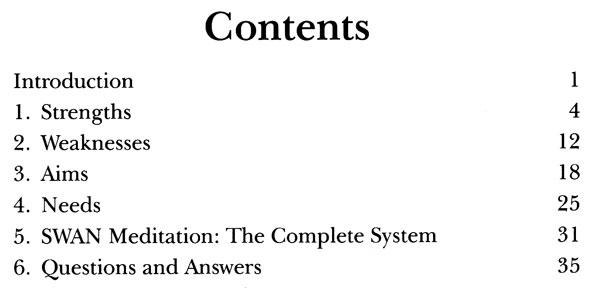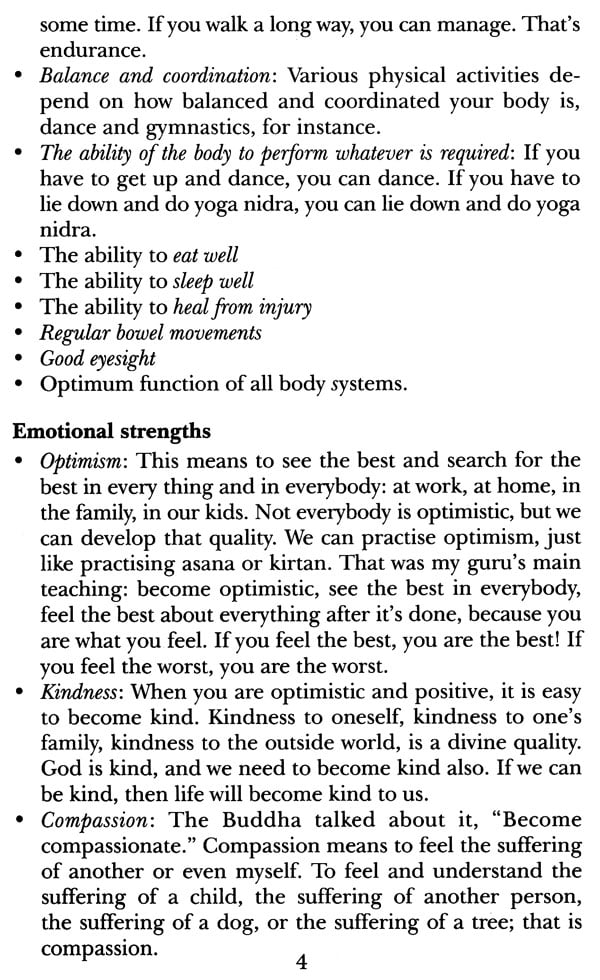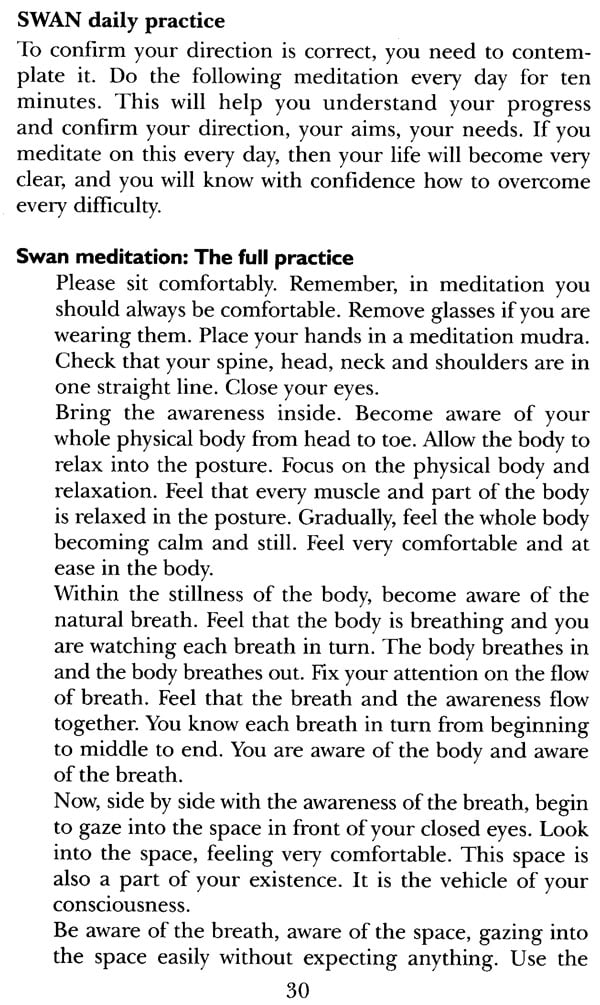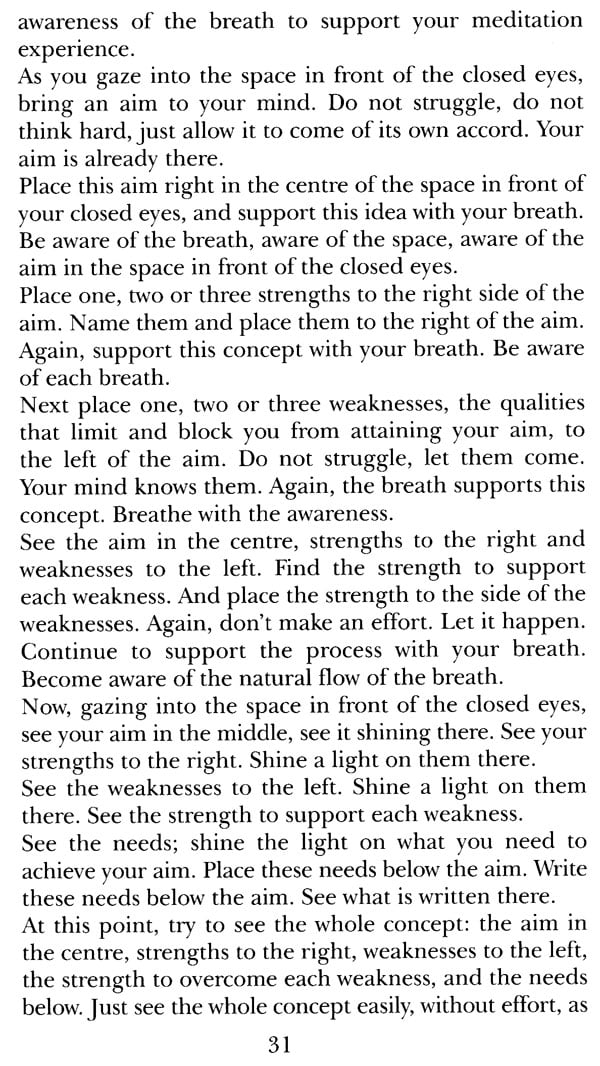
Swan Meditation (Theory and Practice)
Book Specification
| Item Code: | NAR036 |
| Author: | Swami Styadharma |
| Publisher: | Yoga Publications Trust |
| Language: | English |
| Edition: | 2013 |
| Pages: | 50 |
| Cover: | PAPERBACK |
| Other Details | 8.30 X 5.40 inch |
| Weight | 86 gm |
Book Description
SWAN meditation is an important method evolved by Swami Niranjanananda Saraswati to help us discover our personality and improve its expression in everyday life.
SWAN is an acronym for the four principles that influence our personality and direction in life: S - strengths, W - weaknesses, A - ambitions, and N - needs. In each of us certain strengths and weaknesses are predominant, and they either help or hinder us in whatever we think or do.
Throughout life, we must also work to attain our aspirations and needs. The expression of these four qualities makes us what we are. By understanding their unique expression in our life, a creative, dynamic and clear mind results.
Swami Satyadharma was born in 1946. During the years 1965-1975, she travelled extensively throughout the world in search of her spiritual path. In 1975, she was initiated into poorna sannyasa by her guru Swami Satyananda Saraswati, and remained in India as a sannyasin disciple under his guidance.
From 1976 to 1994 she compiled and edited Yoga magazine and many major yoga publications. From 1995 to 2005, she assisted with the establishment of Bihar Yoga Bharati, the world's first yoga university. During this period she directed the Department of Undergraduate Studies and served as a member on the Yoga Education Council.
Swami Satyadharma is currently based in Australia and travels internationally, conducting lectures and seminars, and assisting in the development of Satyananda Yoga worldwide.
The swan has spiritual associations, partly due to its beauty, partly due to the qualities it has that we would like to develop in ourselves. It can walk on the earth, swim and dive in water, and fly through the sky. Humans can only walk on the earth, so it is more versatile than we are.
Discrimination
The swan has another important ability, according to the Vedic texts: it can filter milk from water. This exemplifies the quality of discrimination. Discrimination means to understand the difference between one quality and another, between permanent and impermanent, practical and impractical, something that helps and something that hinders. A yogi should have that ability. In the SWAN practices:
S relates to Strength M
W to Weakness
A to Ambition or Aim
N to Needs
To understand and to discriminate among your strengths, weaknesses, aims and needs: this is empowerment. Normally we don't even think about these qualities, yet at every moment they are active in our lives and they dictate who we are. If we don't understand ourselves and our lives in relation to these qualities, then what is the quality of our lives? They're very close to the lives of animals, although we think humans are so special. What is so special about us if we don't understand the quality of our lives? That is discrimination.
Self-knowledge
Our strengths, weaknesses, ambitions and needs form our personalities. Even after all our education, we still don't know ourselves. Each of us is different. In yoga, it is important for us to do asana and pranayama not only to get to know our bodies better, but also to understand our personalities. If we don't understand our personalities, we can behave oddly, say inappropriate things or perform unsuitable actions. We never know what we will say, what we will feel or how we will behave. We don't know ourselves, so how can we know what we are going to say or how we will behave with someone? We know ourselves externally, but we don't know the ways we are weak or strong or what our personalities mean. We just go through life automatically. Therefore, the SWAN practices are important for helping us to understand ourselves by looking at these four qualities: our strengths, our weaknesses, our aims or ambitions, and our needs. These qualities determine our behaviour, habits, actions and interactions. This understanding is the key to improving our lives.
Self-acceptance
Yoga also speaks about self-acceptance. We need to accept ourselves before we can improve ourselves; however, we need to know ourselves before we can accept ourselves. The Swan practice makes this possible since by examining strengths, weaknesses, aims and needs, we get a picture of ourselves -not as we imagine ourselves to be, but as we are. We have to start where we are. This idea of knowing ourselves, accepting ourselves, as we are, where we are, is the basis of yoga. Understanding ourselves gives us stability and makes our lives more useful to us.
**Contents and Sample Pages**










